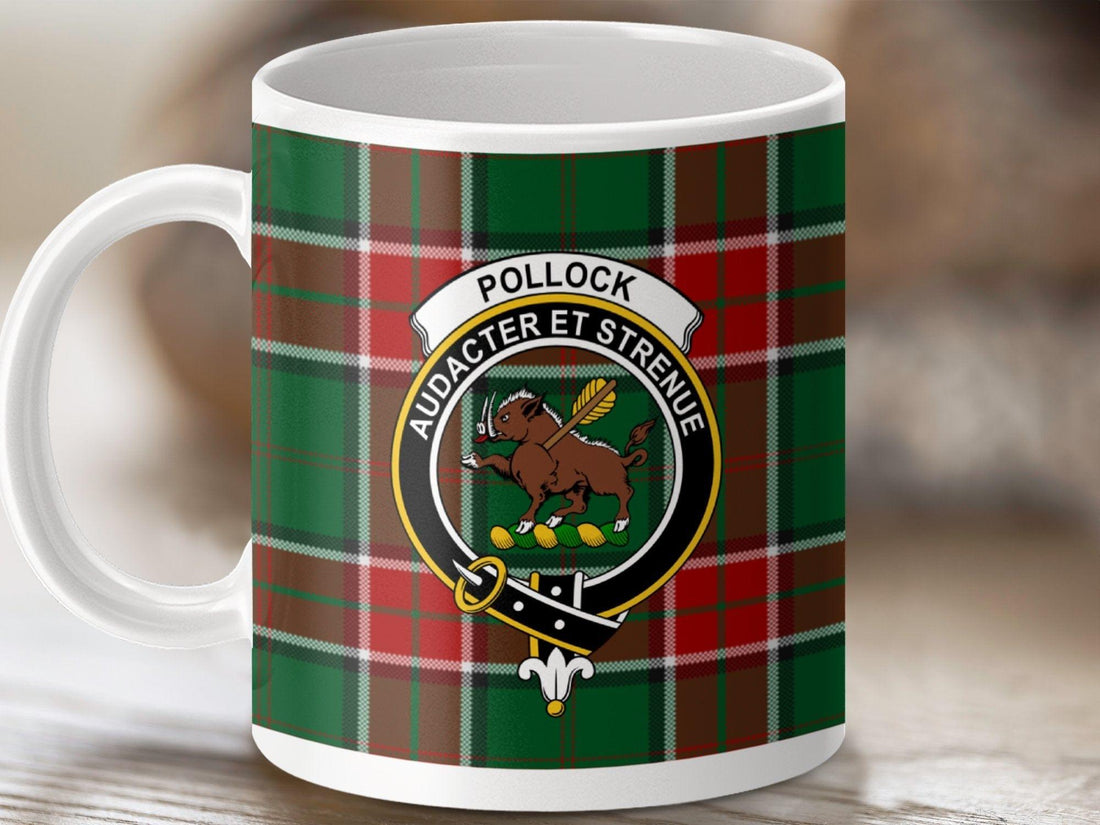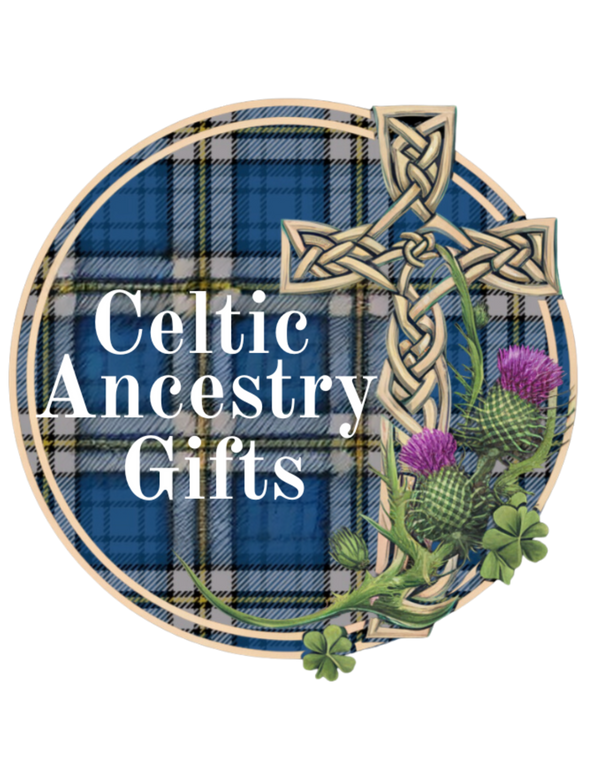
Clan Pollock — The Faithful Guardians of Renfrewshire
Share
1️⃣ Introduction
Among the ancient lineages of Lowland Scotland, few bear a history as quietly noble and steadfast as Clan Pollock. Rooted in the green heart of Renfrewshire, their story intertwines with the early days of the Scottish crown, the rise of the church, and the battles for independence.
The Pollocks were knights, churchmen, and guardians of royal lands — their name bound to the soil of Paisley and the Abbey that stands there still. Their loyalty was legendary, their motto Audacter et Strenue — “Boldly and Earnestly” — a perfect reflection of their enduring strength.
To carry the name Pollock is to carry centuries of devotion, courage, and faith — the story of a family whose quiet dignity helped shape Scotland’s soul.
2️⃣ History & Origins
Norman Roots in a Scottish Land
The surname Pollock (also found as Pollok or Polloc) traces back to the 12th century, when Norman knights came north to serve the Scottish kings. One such knight, Fulbert, followed Walter Fitz Alan, the first High Steward of Scotland, into the lands of Renfrewshire around the year 1150.
As a reward for faithful service, Fulbert was granted lands near Paisley, by the River Cart — rich farmland and wooded hills that would become known as Pollock (from the Brittonic poll, meaning “pool” or “stream”).
Fulbert’s descendants adopted the territorial name de Polloc, marking the beginning of Clan Pollock — one of the earliest Lowland families to take a fixed surname.
Ties to the Royal Stewards
Like their Norman overlords, the Pollocks soon integrated with the Gaelic-Scottish nobility. They served as vassals and trusted allies to the powerful House of Stewart (or Stewart), the future royal dynasty of Scotland.
The Pollocks’ close relationship with the Stewarts placed them at the heart of Scottish political life during the medieval era. Their lands bordered those of the royal family, and their loyalty was rewarded with both privilege and respect.
Early Faith and Foundation
The Pollocks were also patrons of the church. Peter de Polloc, one of the earliest recorded members of the clan, was a benefactor of Paisley Abbey, which became one of Scotland’s great religious centres. His gifts of land and support helped the abbey thrive, earning the family a reputation for piety and generosity.
In return, the monks of Paisley prayed for the souls of the Pollock line — a spiritual bond that endures in Scottish ecclesiastical records to this day.
3️⃣ Spelling Variations & Related Names
Like many old Scottish names, Pollock has appeared in several spellings over the centuries, reflecting regional pronunciation and language change. Common variations include:
-
Pollock
-
Pollok
-
Polloc
-
Pollack
-
Polloch
-
de Polloc (archaic Norman form)
The most ancient form, de Polloc, gradually simplified into Pollok and Pollock as English replaced Norman-French in Scotland. Both spellings remain in use today — Pollok being especially associated with the family’s ancestral lands near Glasgow, and Pollock being more common in diaspora communities.
Associated families and septs that historically allied with Clan Pollock include:
-
Stewart (as feudal overlords and allies)
-
Mure of Rowallan (related through regional marriage ties)
-
Boyd and Cunningham (neighbouring Lowland families)
The Pollocks are sometimes regarded as a sept of Clan Maxwell or Clan Stewart, depending on lineage and geography, but they have long maintained an identity of their own.
4️⃣ Landmarks & Regions Associated with Clan Pollock
Pollok Estate and Pollok House
The ancestral heart of the clan lies in Pollok, near present-day Glasgow. For centuries, this land remained in the hands of the Pollock family and their descendants, who built the grand Pollok House, a stately Georgian mansion surrounded by vast woodlands and parklands.
Today, Pollok House and Pollok Country Park stand as a living reminder of the clan’s legacy. The estate’s beautiful grounds, ancient trees, and sweeping lawns once formed the core of the Pollock barony — a symbol of enduring Scottish heritage.
Paisley and Renfrewshire
The nearby town of Paisley, with its abbey founded by the Stewarts, holds deep significance for the clan. The Pollocks were early patrons of this sacred site, and many of their ancestors were buried there.
Renfrewshire itself, with its fertile river valleys and ancient parishes, remains central to the Pollock identity — a land that has witnessed the clan’s entire story, from Norman settlement to modern Scotland.
Lowland Influence
As a Lowland clan, the Pollocks were less involved in the internecine warfare of the Highland clans, but their influence was profound nonetheless. They were respected for their governance, diplomacy, and stewardship of church lands, qualities that earned them honour throughout Scotland.
5️⃣ Migration & Modern-Day Presence
The Wars of Independence
Members of the Pollock family fought under the banner of King Robert the Bruce during the Wars of Scottish Independence. Records show that John de Polloc and others of his kin were rewarded for their loyalty after the victory at Bannockburn in 1314.
Their steadfast allegiance to Scotland’s cause reflected the clan’s motto — Audacter et Strenue — “Boldly and Earnestly.”
Emigration and Global Legacy
By the 17th and 18th centuries, Pollocks had begun to spread far beyond Renfrewshire. Many emigrated to Ireland, particularly to Ulster, during the Plantation period, and later generations crossed the Atlantic to Canada, America, and Australia.
In North America, the name Pollock (and the variant Pollok) became well established, with many descendants achieving prominence in trade, the arts, and public life. The famous American painter Jackson Pollock traces his ancestry back to Scottish roots, though from another branch of the name.
Clan Pollock Today
Today, the Clan Pollock Society continues to unite members across Scotland, the UK, and the wider world. Annual gatherings and heritage events celebrate the family’s long service to church, crown, and community.
Those who carry the name Pollock — whether in Renfrewshire, New Zealand, or Nova Scotia — share in a proud tradition of honour, resilience, and quiet strength.
6️⃣ Fun Fact
The Pollocks are among the few Scottish families whose name is directly tied to a living place that still bears it. The district of Pollokshields in Glasgow and the ancient Pollok Estate continue to preserve the clan’s name on the map of Scotland.
The clan’s motto, Audacter et Strenue, reflects perfectly the spirit of its people — bold when called upon, earnest in all pursuits, and steadfast in both faith and friendship.
Their crest, a boar’s head erased, symbolises courage, leadership, and unflinching determination — qualities that have defined the Pollock line for nearly nine hundred years.
💚 Search your family name in the search bar above to explore your clan gifts. We offer surname gifts on multiple products like mugs, t-shirts, blankets, ornaments, wall art, phone cases, magnets, flags, and more.

